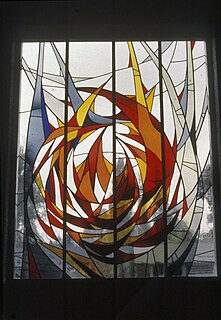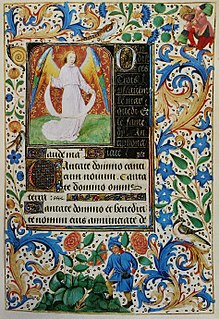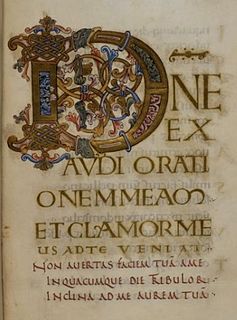
Psalm 104 is the 104th psalm of the Book of Psalms, beginning in English in the King James Version: "Bless the LORD, O my soul. O LORD my God, thou art very great". In the slightly different numbering system in the Greek Septuagint and the Latin Vulgate version of the Bible, this psalm is Psalm 103. In Latin, is known as "Benedic anima mea Domino".

Hodie is a cantata by Ralph Vaughan Williams. Composed between 1953 and 1954, it is the composer's last major choral-orchestral composition, and was premiered under his baton at Worcester Cathedral, as part of the Three Choirs Festival, on 8 September 1954. The piece is dedicated to Herbert Howells. The cantata, in 16 movements, is scored for chorus, boys' choir, organ and orchestra, and features tenor, baritone, and soprano soloists.

Psalm 108 is the 108th psalm in the Book of Psalms. The first verse attributes it to King David, the author of many Psalms. It is a hymn, beginning in English in the King James Version: "O God, my heart is fixed; I will sing and give praise, even with my glory". In the slightly different numbering system in the Greek Septuagint version of the bible, and in the Latin Vulgate, this psalm is Psalm 107. In Latin, it is known as "Paratum cor meum Deus".

Psalm 30 is the 30th psalm of the Book of Psalms, beginning in English in the King James Version: "I will extol thee, O LORD; for thou hast lifted me up". The Book of Psalms is part of the third section of the Hebrew Bible, and a book of the Christian Old Testament. In the slightly different numbering system used in the Greek Septuagint version of the Bible and in the Latin Vulgate, this psalm is Psalm 29. In Latin, it is known as "Exaltabo te Domine". It is a psalm of thanksgiving, traditionally ascribed to David upon the building of his own royal palace.

Psalm 3 is the third psalm of the Book of Psalms, beginning in English in the King James Version: "Lord, how are they increased that trouble me! many are they that rise up against me". In Latin, it is known as "Domine quid multiplicati sunt". The psalm is a personal thanksgiving to God, who answered the prayer of an afflicted soul. It is attributed to David and relates in particular to the time when he fled from his son Absalom.

Psalm 7 is the seventh psalm of the Book of Psalms, beginning in English in the King James Version: "O LORD my God, in thee do I put my trust: save me from all them that persecute me, and deliver me". In Latin, it is known as "Domine Deus meus in te speravi". Its authorship is traditionally assigned to King David. The message in the psalm is that the righteous may seem weak, but ultimately will prevail against the wicked.

Psalm 139 is the 139th psalm of the Book of Psalms, beginning in English in the King James Version: "O Lord, thou hast searched me, and known me." The Book of Psalms is part of the third section of the Hebrew Bible, and a book of the Christian Old Testament. In the Greek Septuagint version of the bible, and in its Latin translation in the Vulgate, this psalm is Psalm 138 in a slightly different numbering system. In Latin, it is known as "Domine probasti me et cognovisti me". The psalm is a hymn psalm. Attributed to David, it is known for its affirmation of God's omnipresence.

Psalm 138 is the 138th psalm of the Book of Psalms, beginning in English in the King James Version: "I will praise thee with my whole heart". The Book of Psalms is found in the third section of the Hebrew Bible, and a book of the Christian Old Testament. In the Greek Septuagint version of the bible, and in its Latin translation in the Vulgate, this psalm is Psalm 137 in a slightly different numbering system. In Latin, it is known as "Confitebor tibi Domine in toto corde meo". The psalm is a hymn psalm.

Psalm 45 is the 45th psalm of the Book of Psalms, beginning in English in the King James Version: "My heart is inditing a good matter". In the slightly different numbering system used in the Greek Septuagint and Latin Vulgate translations of the Bible, this psalm is Psalm 44. In Latin, it is known as "Eructavit cor meum". It was composed by the sons of Korach on the shoshanim–either a musical instrument or the tune to which the psalm should be sung. The psalm has been interpreted as an epithalamium, or wedding song, written to a king on the day of his marriage to a foreign woman, and is one of the royal psalms.
Psalm 54 is the 54th psalm from the Book of Psalms. In the slightly different numbering system used in the Greek Septuagint and Latin Vulgate translations of the Bible, this psalm is Psalm 53. Attributed to David, it was written for one who finds oneself betrayed by a friend.
Psalm 56 is the 56th psalm from the Book of Psalms and the first of a series of five psalms in this part of the book which are referred to as Miktams. In the slightly different numbering system of the Greek Septuagint (LXX) version of the Bible, and in the Latin Vulgate, this psalm is Psalm 55. It is attributed to King David and may be considered representative of him or anyone else hiding from an enemy.

Psalm 71 is the 71st psalm of the Book of Psalms, beginning in English in the King James Version: "In thee, O LORD, do I put my trust: let me never be put to confusion". It has no title in the Hebrew version. In the slightly different numbering system used in the Greek Septuagint and Latin Vulgate translations of the Bible, this psalm is Psalm 70. In Latin, it is known as "In te Domine speravi".
Psalm 86 is the 86th psalm of the Book of Psalms. It is attributed to David. In the slightly different numbering system used in the Greek Septuagint and Latin Vulgate translations of the Bible, this psalm is Psalm 85.

Psalm 96 is the 96th psalm of the Book of Psalms, a hymn. The first verse of the psalm calls to praise in singing, in English in the King James Version: "O sing a new song unto the Lord". Similar to Psalm 98 and Psalm 149, the psalm calls to praise God in music and dance, because he has chosen his people and helped them to victory. It is one of the royal psalms praising God as the King of His people. In the slightly different numbering system used by the Greek Septuagint and the Latin Vulgate, this psalm is Psalm 95.

Psalm 102 is the 102nd psalm of the Book of Psalms, beginning in English in the King James Version: "Hear my prayer, O LORD, and let my cry come unto thee." In the Greek Septuagint version of the bible, and in its Latin translation in the Vulgate, this psalm is Psalm 101 in a slightly different numbering system. In Latin, it is known as "Domine exaudi orationem meam".

Psalm 113 is the 113th psalm of the Book of Psalms, beginning in English in the King James Version: "Praise ye the Lord, O ye servants of the Lord". The Book of Psalms is part of the third section of the Hebrew Bible, and a book of the Christian Old Testament. In the Greek Septuagint version of the bible, and in the Latin translation in the Vulgate, this psalm is Psalm 112 in a slightly different numbering system. In Latin, it is known as "Laudate pueri Dominum".

Messiah, the English-language oratorio composed by George Frideric Handel in 1741, is structured in three parts. The wordbook was supplied by Charles Jennens. This article covers Part I and describes the relation of the musical setting to the text. Part I begins with the prophecy of the Messiah and his virgin birth by several prophets, namely Isaiah. His birth is still rendered in words by Isaiah, followed by the annunciation to the shepherds as the only scene from a Gospel in the oratorio, and reflections on the Messiah's deeds. Part II covers the Passion, death, resurrection, ascension, and the later spreading of the Gospel. Part III concentrates on Paul's teaching of the resurrection of the dead and Christ's glorification in heaven.

Messiah, the English-language oratorio composed by George Frideric Handel in 1741, is structured in three parts. This listing covers Part II in a table and comments on individual movements, reflecting the relation of the musical setting to the text. Part I begins with the prophecy of the Messiah and his birth, shows the annunciation to the shepherds and reflects the Messiah's deeds on earth. Part II covers the Passion in nine movements including the oratorio's longest movement, an air for alto He was despised, then mentions death, resurrection, ascension, and reflects the spreading of the Gospel and its rejection. The part is concluded by a scene called "God's Triumph" that culminates in the Hallelujah Chorus. Part III of the oratorio concentrates on Paul's teaching of the resurrection of the dead and Christ's glorification in heaven.

"Christians, awake, salute the happy morn" is an English Christmas hymn on a text by John Byrom. It is usually sung to the tune "Yorkshire" by John Wainright.